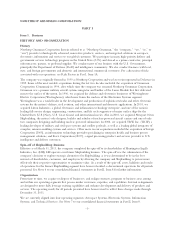Northrop Grumman 2011 Annual Report Download - page 19
Download and view the complete annual report
Please find page 19 of the 2011 Northrop Grumman annual report below. You can navigate through the pages in the report by either clicking on the pages listed below, or by using the keyword search tool below to find specific information within the annual report.NORTHROP GRUMMAN CORPORATION
䡲We depend heavily on a single customer, the U.S. Government, for a substantial portion of our business.
Changes in this customer’s priorities and changes affecting its ability to do business with us could have a
material adverse effect on our financial position, results of operations, or cash flows.
Our primary customer is the U.S Government, from which we derived more than 90 percent of our total
revenues during each of the past several years. The federal government is implementing significant changes and
reductions to government spending and other programs. We cannot predict the impact on existing, follow-on
or replacement programs from potential changes in priorities due to changes in defense spending levels,
military transformation and planning, and/or changes in social-political priorities. A shift in government
priorities to programs in which we do not participate and/or reductions in funding for or the termination of
programs in which we do participate, unless offset by other programs and opportunities, could have a material
adverse effect on our financial position, results of operations, or cash flows. In addition, we believe uncertainty
and other concerns resulting from previously announced proposed defense spending reductions and potential
additional reductions, including under the Budget Control Act of 2011 (the Budget Control Act), have
impacted and are likely to continue to impact the manner in which our U.S. Government customers manage
programs and/or make procurement decisions, resulting in delays and reductions in payments and
procurements. Similar challenges and uncertainty faced by some of our international government customers
could also lead to delays and/or reductions.
In addition, the U.S. Government generally has the ability to terminate contracts, in whole or in part, without
prior notice, for its convenience or for default based on performance. In the event of termination for the
U.S. Government’s convenience, contractors are generally protected by provisions covering reimbursement for
costs incurred on the contracts and profit on those costs but not the anticipated profit that would have been
earned had the contract been completed. In some circumstances, however, a U.S. government contract does
not have such termination protection. In those cases, we attempt to mitigate the termination risk through
other means. To the extent such means are unavailable or do not fully address the costs incurred or profit on
those costs, we could face significant losses from the termination for convenience of a contract that lacks
termination protection. Termination by the U.S. Government of a contract for convenience could also result
in the cancellation of future work on that program. Termination by the U.S. Government of a contract due to
our default could require us to pay for re-procurement costs in excess of the original contract price, net of the
value of work accepted from the original contract, as well as other damages. Termination of a contract due to
our default may expose us to material liability and could have a material adverse effect on our ability to
compete for other contracts.
䡲Significant delays or reductions in appropriations for our programs and federal government funding more broadly
may negatively impact our business and programs and could have a material adverse effect on our financial
position, results of operations or cash flows.
The funding of U.S. Government programs is subject to an annual congressional budget authorization and
appropriation processes. For many programs, Congress appropriates funds on a fiscal year basis even though the
program performance period may extend typically several years. Consequently, programs are often partially
funded initially and additional funds are committed only as Congress makes further appropriations. If we incur
costs in excess of funds committed on a contract, we may be at risk for reimbursement of those costs until
additional funds are appropriated. We cannot predict the extent to which total funding and/or funding for
individual programs will be included, increased or reduced as part of the annual budget process ultimately
approved by Congress or in separate supplemental appropriations or continuing resolutions, as applicable. The
impact, severity and duration of the current U.S. economic situation and economic plans adopted or to be
adopted by the U.S. Government, along with pressures on, and uncertainty surrounding, the federal budget,
could adversely affect the funding for individual programs and delay purchasing or payment decisions by our
customers. In the event that government funding for any of our programs becomes unavailable, or is reduced
or delayed, our contract or subcontract under such program may be terminated or adjusted by the U.S.
Government or the prime contractor, which could have a material adverse effect on our financial position,
results of operations, and/or cash flows.
-9-
























